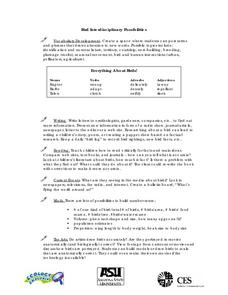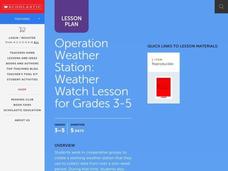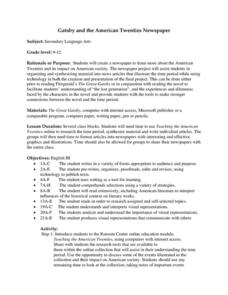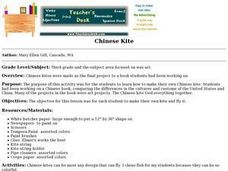Curated OER
What on Earth is in the Earth?
Students explore the physical properties of sand, soil, and rocks and sort, classify, compare, and contrast the materials found in the soil. The differences between the living and non-living parts of the soil is discussed.
Curated OER
Bird Interdisciplinary Possibilities
Students explore birds, their territory, breeding, and seasonal movement. They research and collect information on birds through writing letters to ornithologists, reading in books, comparing web sites, and observing pictures. Students...
Curated OER
Day to Day Life in a Small African Village
Students analyze life in a village of Tanzania including its language, geography, health, and hygiene issues. In this African village lesson plan, students locate Tanzania and its capital city on a map. Students compare aspects...
Curated OER
Working with Percentages
Middle schoolers complete basic operations using percentages in a variety of real world situations. Discounts are computed and compared to a variety of prices listed in local newspaper advertisements.
Curated OER
Elementary Statistics in Life
Students examine newspapers for graphs. They collect and sort data that is of interest to them. They enter data into a database and make comparisons using the information.
Media Smarts
Advertising All Around Us
Here is a set of advertising lessons, explore language, techniques, representation, and target audiences. Discuss the impact ads have on our daily lives. What do we see and how do they make us feel? Observe ads from around the...
Curated OER
ACROSTIC POETRY
Young scholars use newspapers or magazines to create an acrostic poem where words are divided into parts of speech.
Curated OER
Covering the News
Students compare the coverage of two crime stories Using local or national newspapers, news magazines and other reference materials, each group trace the "unfolding" of two crime stories: The Laci Peterson investigation plus one students
Curated OER
Through the Eyes of Al McIntosh
Learners examine World War II through the eyes of local journalists such as Al McIntosh. As a class, they discuss how stories about the war affects the public back at home. In groups, they compare and contrast how newspapers reported...
Curated OER
Operation Weather Station
Students work in cooperative groups to create a working weather station. Tkey use the weather station to collect weather data over a one-week period. Students compare the data from their weather station to actual weather information...
Curated OER
Gatsby and the American Twenties Newspaper
Students research 1920's US History. In this historical literature lesson, students use the novel The Great Gatsby as a tool to examine the era. They work in individually to create newspaper articles based on different...
Curated OER
Goldilocks and the Real Bears
Students participate in a comparison lesson where they compare fictional bears to real life bears. In this science/language arts lesson, students read Goldilocks and the Three Bears. Students observe characteristics...
Curated OER
Consider the Source
Students explain how to critically compare news reporting from around the world, focusing on coverage of the Taliban regime. They compare and contrast television and print media reporting on the issue.
Curated OER
Political Issues Survey
Fifth graders develop and conduct a survey regarding issues in a current political campaign. They distribute and collect the surveys, input the data using a spreadsheet program, and compare/contrast the recorded results.
Curated OER
Runaway Indentured Servants
Students compare and contrast indentured servants and slaves. In this US history slavery lesson plan, students discuss the owners' perceptions of indentured servants and slaves, then view ads for runaway slaves to support their opinions....
Curated OER
The Red Badge of Courage: A New Kind of Realism
Sudents compare specific excerpts from The Red Badge of Courage to first-hand accounts of Civil War battles, in text and images and list elements of Crane's style in The Red Badge of Courage that contribute to its realism.
Curated OER
Chinese Kite
Students create their own Chinese kite. In this multicultural art lesson plan, students use butcher paper, newspapers, string, pipe cleaners and paint to create a Chinese kite. Students follow the given steps and attempt to fly their kite.
Curated OER
Getting the News about the Stamp Act
Students review opinions of the Stamp Act as stated in colonial newspaper articles of the 1760's. They compare colonial newspapers to those of today. They take a side regarding the Tax Act and write a note to a friend explaining their...
Curated OER
Bias
Students apply techniques of distinguishing between fact and opinion. Students identify words associated with persuasion and argument. Students read and categorizer a variety of newspapers and articles. Students identfy bias in a...
Curated OER
That Was Then, This is Now
Learners read about the effect of strict fur trading laws on the lives of the Inuit people in Canada, then use print and digital resources to compare past and present-day ways of life of several indigenous peoples around the world.
Curated OER
EARLY CIVILIZATIONS
Middle schoolers compare and contrast the monuments of four ancient cultures and draw conclusions about the origins, construction, and purposes of these structures.
Curated OER
Do They Play Sports in Costa Rica?
Students use the Internet to discover what types of sports the people of Costa Rica play. They write a paper in English but must use at least one Spanish quote. In the paper they compare/contrast sports in Costa Rica and the United States.
Curated OER
Fizzy Pop
Fifth graders compare and identify variables that affect the rate of a chemical change using Alka-Seltzer, water, ice, and hot water. They time how long each variable takes to pop the canister into the air, and record the results on a...
Curated OER
Whose Religion Is It?
Students analyze the impacts of religious expectations on gender roles. In this gender equity instructional activity, students compare and contrast different religions in societies in order to understand the cultural influences and...

























